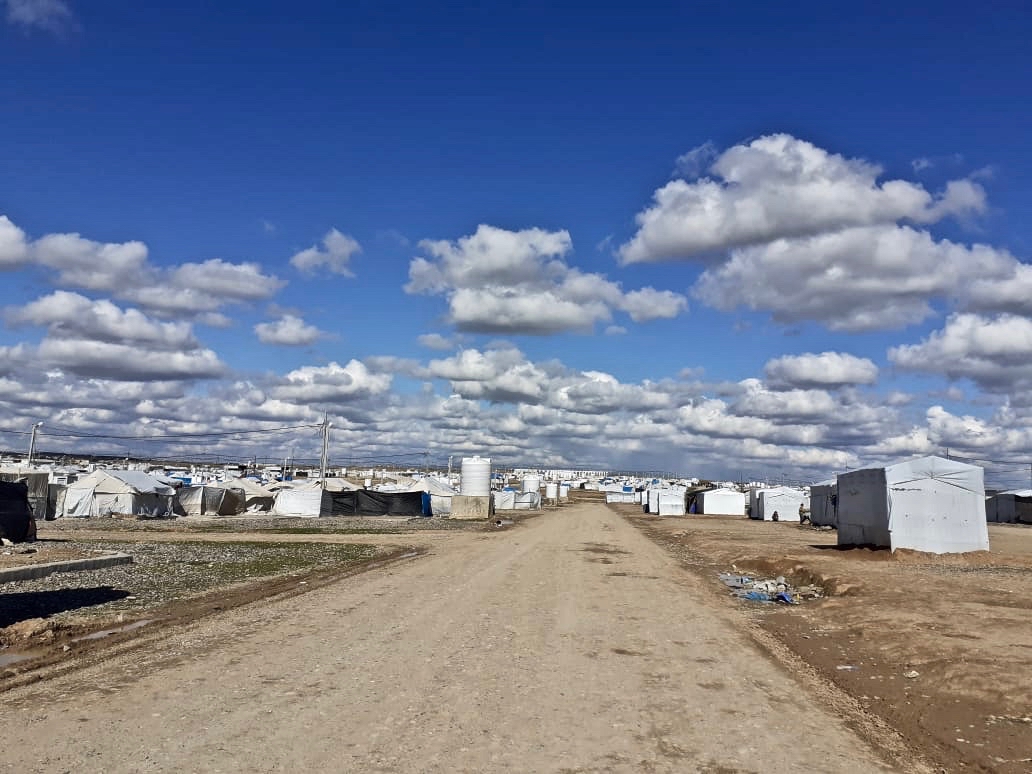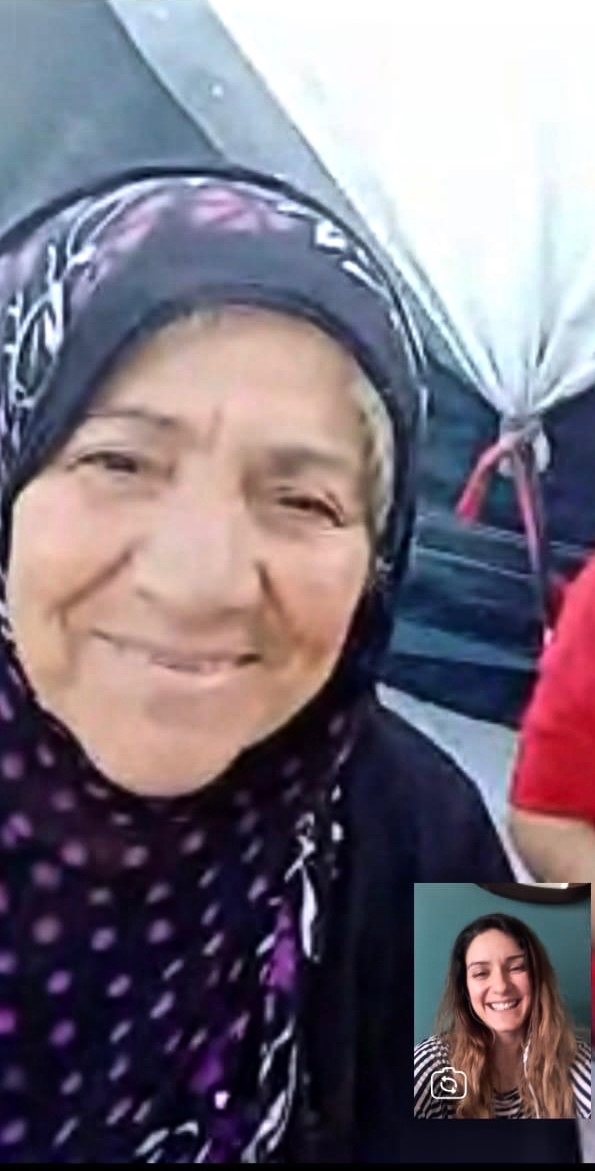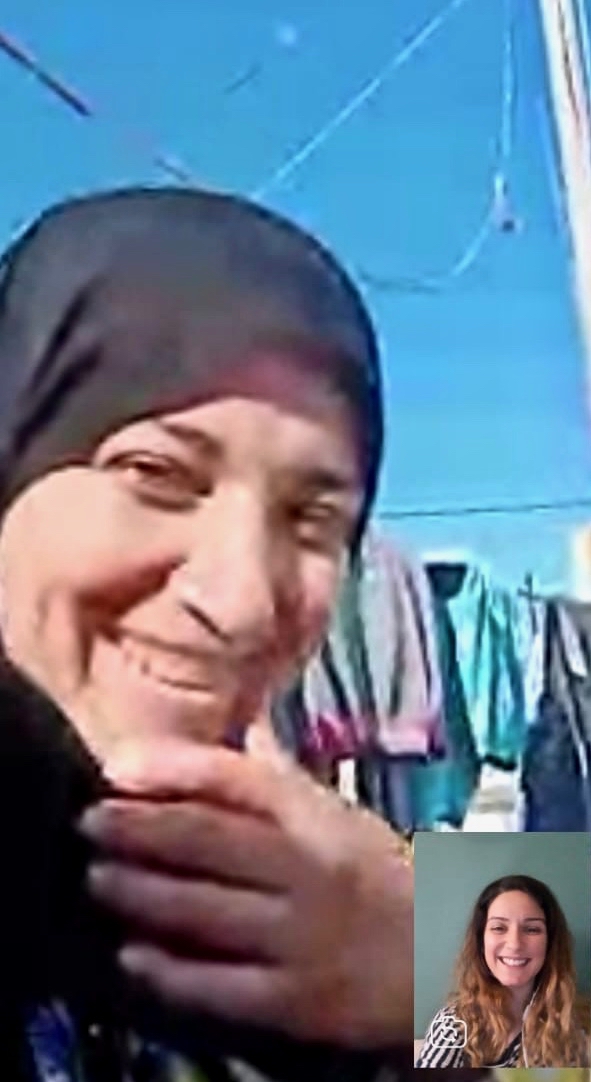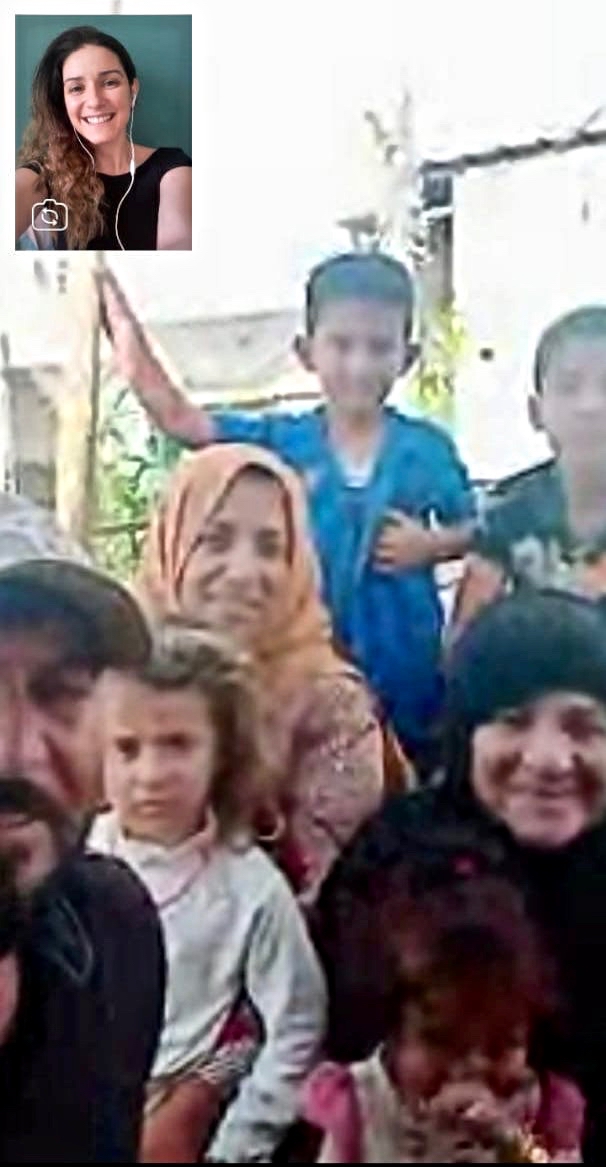“My darling, I have a tent now”: a long-distance relationship with IDP families in the time of corona
You support protection officers, like Sara from Egypt. Sara is still working for our program in Iraq, even though the recent COVID-19 travel restrictions have caused Sara to continue her protection work remotely. Your continued support of remote workers like Sara is critical for the protection and safety of displaced families during the pandemic.
 Salamiyah Camp
Salamiyah Camp
Recently, as I spent time looking at a photo that I took of the South Mosul camp for internally displaced persons (IDPs) on a sunny day, I received a text from one of the women I worked with in the camp. She was asking, “How are you? We miss you.” I recalled the scene where I’d walk around the camp, greeting everyone who passed by, and sharing lunch with people in their tents. Nowadays, I cannot meet them in person due to the situation with COVID-19, but we keep talking every day as if we are together physically.
 Zeinab and SaraA few months ago, I was working and living side-by-side with the local community in the South Mosul camps in Iraq, where I was invited daily to IDP tents for chai tea and to listen to their stories. For them, the opportunity to share their stories became more significant than any promises a humanitarian nongovernmental organization (NGO) might offer them.
Zeinab and SaraA few months ago, I was working and living side-by-side with the local community in the South Mosul camps in Iraq, where I was invited daily to IDP tents for chai tea and to listen to their stories. For them, the opportunity to share their stories became more significant than any promises a humanitarian nongovernmental organization (NGO) might offer them.
“When the coronavirus started and later we were locked in the camp, I thought we would be forgotten by everyone. There were limited services and a lack of NGOs present, in addition to the general uncertainty we had. But you’ve always been in contact with us and we miss seeing you,” shared Zeinab Taher, a 70-year-old woman displaced from western Mosul. She had called me from the camp in Iraq.
“There are no corona cases at the camp. It feels different. The market is empty and no one is allowed in or out. Tell me, is it that bad? Are there a lot of people dying because of corona? I do not know anything!” Zeinab asked.
As the outbreak grew, I temporarily moved back to my home in Cairo, Egypt. Nevertheless, it has been crucial for our work that I keep in direct contact with the IDPs. As a part of Nonviolent Peaceforce’s Protection Team, working within these communities has led me to build strong relationships with those most affected by conflict and violence in Iraq in recent years: people like Zeinab.
Last winter, Zeinab and I met for the first time while my colleague and I patrolled the camp. On our patrol, we were approached by Zeinab—a smiling woman, her hijab revealing a few gray hairs—who warmly invited us to her son-in-law’s tent.
Over a cup of tea, she began telling us her story and I want to share it with you today:
Zeinab represents just one, single-headed household without support. She is an elderly woman who must care for her seven grandchildren (four girls and three boys) and urgently needed a tent.
Last year, Zeinab departed the camp to return to her area of origin. Even though it was where she had lived before fleeing and living in the camp, her community had been transformed in the time since she had lived there—her house was completely destroyed. She found herself unable to afford basic items, even food and a home. Zeinab decided that she had no other choice than to return to the camp. Upon her return, Zeinab lived with her daughter, son-in-law, and their children (10 in total), as well as her divorced daughter who also lived with them. Her son-in-law had two tents, where 18 to 19 people resided.
But Zeinab wanted to live on her own with her grandchildren, because there was no space. “All I need is a tent large enough for us, in order to survive,” she shared. Lack of adequate shelter was not the only problem Zeinab faced: at the backdrop of the war, her grandchildren were not officially registered to the government. “For the Iraqi state, they don’t even exist! And it’s the same problem here, in the camp. We are not registered, so we cannot have food rations or shelter, and the children can’t go to school,” she added. A common situation: according to Norwegian Refugee Council, an estimated 45,000 displaced children in Iraq are missing civil documentation, preventing them from accessing basic services.  Zeinab's daughter and Sara
Zeinab's daughter and Sara
After hearing Zeinab’s story over tea last winter, I knew that something more had to be done. Nonviolent Peaceforce has a strong relationship with the people managing the camp, so I knew that I could follow up on Zeinab’s case. I explained Zeinab’s exceptional situation to them as an elderly person facing extreme vulnerability.
Continuing my work from Cairo, I kept in touch with Zeinab. A few weeks ago, when I heard that she still had not received her tent, I followed up with the people managing the camp. Advocating for the basic needs of displaced people like Zeinab is so important, because otherwise it can take such a long time—or it might not happen at all.
 Group Family PhotoThis is why I was thrilled when I received a follow-up video call from Zeinab’s son-in-law. He shared that Zeinab had finally received her tent! At his request, I video called with the entire family, including the children and even a neighbor who was passing by.
Group Family PhotoThis is why I was thrilled when I received a follow-up video call from Zeinab’s son-in-law. He shared that Zeinab had finally received her tent! At his request, I video called with the entire family, including the children and even a neighbor who was passing by.
During this chat, I noticed that Zeinab’s granddaughter was wearing comfortable, clean clothes. She looks loved and cared for. What also stands out is a necklace that she wears: colorful beads in a child-like arrangement. Her own little hope.
Zeinab’s son-in-law looked stern and often his gaze shifts somewhere into himself, wearing his concern for his family on his face. Still, Zeinab’s daughter smiles the brightest. She shines from being able to tend to washing her family's clothes. Caring for what little they have, besides one another.
“Sara, my darling, I have a tent now! A temporary house! Once you are back in Iraq, I am inviting you for lunch at my own tent! I hope this virus goes away. We miss you.” said Zeinab over the phone.
“You used to visit us often, but now, we no longer have any visitors,” her daughter added.
Although I am 1,429 kilometers away, I am even more deeply aware of the importance of this work, committed to the populations it serves, and I am continually humbled and inspired by the people whose lives that it touches.
For me, again residing in my own family’s home, sometimes I wonder if I do, or even can do, enough. When I remember Zeinab and her family, their faces, the sound of their voices, their gratitude, I’m reminded of how sometimes “enough” is just that—if it can help just one person or a family.
